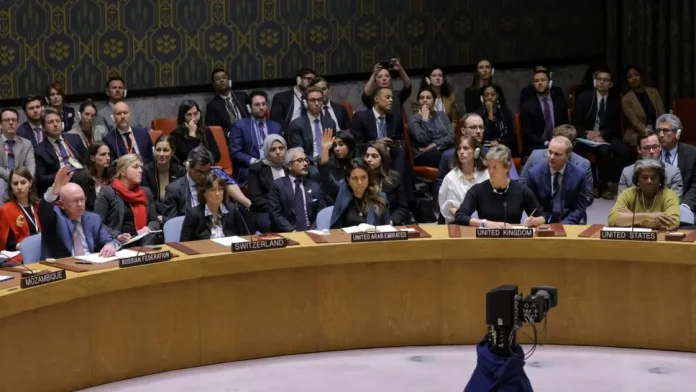Two draft resolutions separately proposed by the US and Russia on the ongoing Israeli-Palestinian conflict have failed to pass in the UN Security Council.
Rival countries again put forward doomed-to-be-defeated texts, despite what diplomats said was a last-ditch attempt by France to postpone the vote and find a compromise. Russia and China vetoed the US-led draft resolution, while the text proposed by Moscow did not receive enough support.
The US, a historic supporter of Israel, which last week exercised its veto, put forward a resolution supporting “humanitarian pauses” to deliver aid to the blockaded Gaza Strip and the right of “all states” to self-defence under international law. However, the US version of the resolution did not include a word about a full ceasefire. Moscow offered its own proposal for consideration, which “condemns all violence and military action against civilians” and expects “an immediate, durable and fully respected humanitarian ceasefire”.
Ten countries backed the US resolution, but China and Russia used their veto power. Representatives of the Arab bloc, the United Arab Emirates, whose relations with Israel have warmed markedly since normalisation in 2020, also voted against it, while two other countries, Brazil and Mozambique, abstained. The Russian representative, Vassily Nebenzia, said:
It has became clear from that the US simply doesn’t want UN Security Council decisions to have any kind of influence on a possible ground offensive by Israel in Gaza. This extremely politicised document clearly has one aim — not to save civilians but to shore up the US political position in the region.
US Secretary of State Antony Blinken, promoting the resolution at Tuesday’s high-level Security Council meeting, spoke of “humanitarian pauses” without a formal ceasefire. US Ambassador Linda Thomas-Greenfield insisted the United States had taken into account the views of other countries around the world after vetoing the resolution. She also blamed Russia for putting forward its own text “with zero consultation” and “with a number of problematic sections”. Thomas-Greenfield said:
The United States is deeply disappointed that Russia and China vetoed this resolution. We did listen to all of you.
Only China, the United Arab Emirates, Russia and Gabon voted in favour of the draft resolution. Nine countries, including US allies France and Japan, abstained. The US and the UK voted against it. UAE Ambassador Lana Nusseibeh said the Security Council should respond “tangibly” to the complex situation in Gaza. She said at the high-level session Tuesday:
We heard dozens of statements imploring this council to assign the same value to Palestinian life as it does to Israeli life. We cannot allow any equivocation on this point. There is no hierarchy of civilian lives.
The broader UN General Assembly is scheduled to discuss the war on Thursday and Friday. Resolutions of that body, which represents all UN members and has no veto power, are non-binding. However, Arab countries are drafting a resolution that could be put to a vote as early as this week. The draft resolution calls for an immediate ceasefire and unimpeded humanitarian access to Gaza.
On 7 October, Hamas militants infiltrated Israel, taking 222 hostages. In response, Israel began relentless artillery shelling of Palestine. Israeli authorities declared a total siege of the Gaza Strip. More than one million people – almost half the population of Gaza – have been displaced within the enclave.
More than 6,500 Palestinians have been killed, mostly civilians, and there are fears that the death toll could rise further if Israel launches a widely anticipated ground invasion to destroy Hamas and rescue the hostages.
